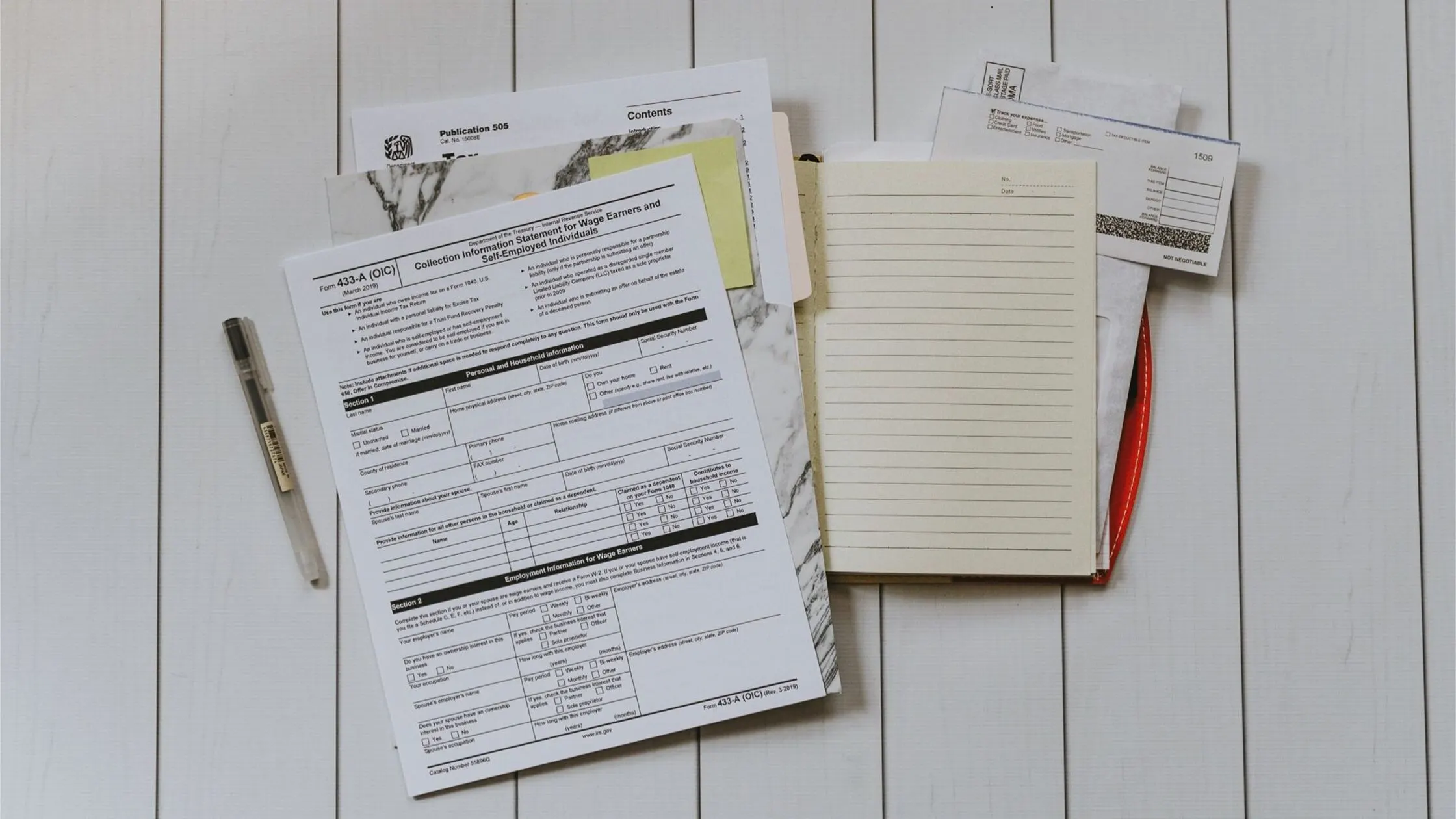
Rising rent prices and tighter application processes have made credit references on a rental application more important than ever. These references are a direct reflection of your financial habits. So, what are credit references on a rental application, and how do you make yours stand out? Let’s break it down.
What Is a Credit Reference on a Rental Application?

A credit reference on a rental application is a person or institution that can attest to a tenant’s ability to manage money and pay bills on time.
This person gives the landlord or property manager extra assurance that they’re a reliable renter. Instead of relying only on the renter's credit score or credit report, landlords may ask for these references to know their financial habits and responsibility.
Renters might be asked to list names and contact details for people, usually professionals, who can confirm that they’ve paid rent, managed bills, or handled finances well in the past.
Pro Tip:
A credit reference's meaning is not the same as a credit report or credit score.
- Your credit report is a detailed record of your loans, debts, and payment history.
- Your credit score is a three-digit number based on that report.
- A credit reference is a real person or company that vouches for you, often giving specific examples of your financial reliability.
Why Are Credit References Part of Rental Applications?

Credit references actively tilt approval odds in the tenant’s favor. If the tenant’s credit score is low or they don’t have much credit history, a good recommendation from a landlord or employer can help. Landlords want to feel confident, and a detailed recommendation about renters’ financial behavior can make a big difference.
When a previous landlord speaks highly of their ability to pay on time and handle responsibilities well, it gives their application a human layer of trust that credit scores or AI screening simply can’t provide.
Landlords value this kind of reference because, at the end of the day, renting out property is a risk. Credit references added a sense of trust is becoming even more important in 2025. According to industry data, 85% of landlords raised rent in 2024, and nearly 80% plan to raise it again this year. To make quicker tenancy decisions, many are turning to automated tools and AI-driven screening platforms.
But while these systems are efficient, they aren't perfect. These systems often miss important context or unfairly flag responsible renters. And we’re seeing real-world consequences: lawsuits and settlements, like the case against SafeRent, have exposed how AI screening can disproportionately harm low-income renters or applicants of color.
So, what does all this mean for you as a landlord? A solid rental application credit reference can be one of your most reliable tools for evaluating a potential tenant. In an age of rapid digital screening, a thoughtful, honest reference from a real person helps you see beyond the numbers.
Who Makes a Strong Credit Reference on a Rental Application?

Landlords are looking for professional or financial contacts who know how well tenants handle money and responsibilities.
1. Previous Landlords (Top Choice)
A former landlord is often considered the gold standard of credit references. They’ve experienced firsthand how tenants handled rent payments, communicated during your lease, and cared for the property. Their testimony holds a lot of weight because it directly reflects your behavior as a tenant. When a landlord can confidently say a renter paid on time, followed the rules, and left the unit in good condition, it builds trust faster than almost any other reference.
2. Property Managers
If your rental was managed by a company, the property manager can also serve as a solid credit reference when renting They usually keep records of payment history and can quickly confirm your reliability.
3. Current Employer (HR Contact or Supervisor)
A boss or HR representative can confirm that you have stable income and behave responsibly at work - two things that suggest you’ll also be a reliable renter. They don’t need to know your financial details, just your consistency, pay range, and professionalism.
4. Accountant, Lawyer, or Other Verified Professionals
For renters who are self-employed, freelancers, or don’t have a traditional landlord or employer, professionals who handle your finances can step in as trusted credit references. Accountants, lawyers, or financial advisors have insight into your financial habits. Their endorsement signals to landlords that you’re financially organized and trustworthy, even if your rental history isn’t standard.
What Are the 3 Types of Credit References for Rental Applications?
In fact, there are three main examples of credit references that renters can offer, and each serves a different purpose. Depending on your work background, lifestyle, or financial setup, one type may be more relevant than another.
1. Asset-Based References
An asset-based reference shows that you have money saved or invested. Landlords see this as a safety net: even during a slow work month or career transition, you can still cover rent.
Who qualifies to provide an asset-based reference?
- A bank or credit union representative
- A certified investment advisor or financial planner
- Wealth manager or retirement account administrator
What to include in the reference letter:
- Confirmation of your savings or investment accounts
- An indication that funds are stable and accessible
- A statement of your general financial responsibility (without revealing exact numbers unless you choose)
Sample Letter (Asset-Based):
2. Financial Documentation
This type of reference is based on income and payment history. It’s the most common type used in rental applications and helps landlords quickly assess a tenant’s monthly income to see whether they can afford the rent.
Who qualifies to provide financial documentation?
- Your employer (HR rep or direct supervisor)
- Payroll or accounting officer
- A freelance client (if long-term and verifiable)
- Tax professional (especially for self-employed individuals)
What to include in the financial documentation letter:
- Job title, employment duration, and income verification
- Confirmation of steady pay and professionalism
- Optional: include info about bonus structure or contract length
Sample Letter (Financial):
3. Character-Based References
A character-based credit reference comes from someone who can vouch for your behavior. It’s personal, but still professional.
Who qualifies to provide character-based references?
- Previous landlords or property managers (best option)
- Roommates who shared a lease (if responsible for payments)
- Long-term client (for freelancers who work from home)
- Community leaders or professionals (e.g., clergy, attorney) who know your lifestyle and dependability
What to include in the character-based references letter:
- How do they know you, and for how long
- Specific examples of your payment habits, communication, and general reliability
- Mention of respect for property, neighbors, and lease terms
Sample Letter (Character-Based):
Who NOT to List as a Credit Reference
Listing the wrong person can set you back. Landlords need credible, unbiased, and verifiable sources who can speak directly to how you handle money and responsibilities. Here’s who to avoid:
1. Friends or Family Members
Your parents might think the world of you, and your best friend may swear you're the most organized person alive, but their opinions don’t count much on a rental application.
Personal relationships create unavoidable bias, and landlords know that. Friends and family can’t provide neutral insight into your rent history, financial discipline, or professionalism. Their reference may feel heartfelt, but it lacks the objectivity landlords need to make a sound decision.
2. Anyone Unfamiliar With Your Financial Behavior
It’s not enough for someone to know you; they need to know how you manage your obligations. A former professor, casual acquaintance, or supervisor who never dealt with your payment habits won’t be able to speak to your reliability as a tenant.
These kinds of references often result in vague letters that raise more questions than answers. If someone can’t confirm how you handle money, rent, or long-term commitments, they’re not the right person to speak on your behalf.
3. Someone With No Verifiable Title or Contact Info
Landlords need to be able to follow up on references if needed. Listing someone who can’t be reached easily or whose position can’t be confirmed can make your application appear incomplete or even suspicious.
A vague family accountant with no official company or reference, with just a first name and personal email address, doesn’t cut it. Choose professionals who can be verified with a title, business contact, or official letterhead. It adds legitimacy and builds trust.
What Should Landlords & Tenants Do If There Is No Credit Reference?

Not every renter has a full credit history or a list of past landlords ready to vouch for them, and that’s okay. There are still reliable ways to present yourself as a qualified and responsible tenant. And landlords have other ways to evaluate a renter beyond just credit references.
Alternative Factors Landlords Can Review Instead
When a rental application credit reference isn’t available, landlords can and should look at the full financial situation. These three key areas offer valuable insight:
- Employment history: A steady job history suggests long-term stability. Even without a formal reference, showing that you’ve held a consistent position (or worked steadily in a trade or freelance career) can give landlords peace of mind.
- Rent-to-income ratio: Most landlords look for a rent payment that doesn’t exceed 30%–35% of your income. Showing that your rent won’t stretch your budget too thin is often more important than what your credit file says.
- Debt load: A tenant with low monthly debt is often in a better financial position, even with limited credit references. Clear documentation of student loans, car payments, or other recurring expenses helps landlords understand your financial obligations in full.
Alternatives Tenants Can Use
Tenants without traditional credit references when renting still have strong options.
- Bank statements: A few months of recent statements showing consistent income and spending patterns can substitute for formal references. This reflects many of the same qualities as credit checks and helps paint a real-time picture of how you manage your money.
- Guarantor or co-signer: Having someone with strong credit agree to back your lease can reassure landlords that the rent will be paid, even if they don’t rely on your history alone.
- Proof of rent paid in cash (receipts, Venmo, etc.): Paying in cash doesn’t mean your record is invisible. Show old receipts, screenshots of Venmo payments, or signed statements from past landlords to build a payment trail. It’s not about perfection—it’s about transparency.
Landlords are ultimately looking for one thing: confidence. When references aren’t available, consistent documentation and a well-prepared application can still move the needle in your favor.
Best Practices for Landlords To Verify Credit References Efficiently
Efficient verification saves time, reduces risks, and helps landlords find tenants they can trust. We’ve listed some best practices to keep the process solid and straightforward.
Ask for Verifiable Contact Info
Start with the basics: make sure every credit reference comes with full, accurate contact details.
- Phone number
- Email address
- Preferably, a physical address connected to a professional or business
Without verifiable contact info, references can’t be trusted because they can’t be confirmed. It’s also helpful to ask for the person’s job title and company name, so you know you’re speaking with someone who legitimately knows the applicant’s financial behavior. Taking this extra step up front prevents wasted time chasing down unverifiable leads later.
Cross-Check with Employment or Rent Payment Records
For employment references, landlords should confirm job titles, dates of employment, and income levels with HR or payroll records when possible. Similarly, rent payment histories can often be verified through previous lease agreements, canceled checks, or payment platforms like Venmo or Zelle.
Cross-checking these details ensures that references aren’t exaggerating or providing inaccurate information, and it shows the landlord is thorough.
Watch for Red Flags (Vague Titles, No Proof)
Landlords need to stay alert for anything that feels off. Vague job titles, references who can’t clearly describe their relationship with the tenant, or reluctance to provide proof are all red flags. A reference who is unwilling or unable to provide verifiable details may be hiding something, such as a history of late payments or disputes.
Use Tenant Screening Services
Technology has transformed how landlords verify tenant information. Professional tenant screening services offered by LeaseRunner provide comprehensive reports that compile credit history, criminal background, eviction records, and sometimes even previous landlord feedback.
Our services can save landlords significant time and provide an objective snapshot of an applicant’s reliability. While personal credit references on rental applications add valuable context, using screening services creates a well-rounded picture that reduces risk and speeds up decision-making!
Bottom Line
So, what are credit references on a rental application? Simply, they’re personal or professional endorsements that confirm you’re a trustworthy tenant.
Providing strong credit references can be the deciding factor in landing the rental you want! And remember, make sure to include credit references in tenant screening reports to boost your chances of getting that lease signed!
FAQs
Q1. What to use for credit references on a rental application?
The best references usually fall into three categories:
- Asset-based (like a bank or investment manager who can confirm your savings),
- Financial documentation (such as your employer or accountant who verifies steady income),
- Character-based references (previous landlords or property managers who can speak to your rent payment history and behavior).
Always choose people or institutions who know your financial habits well and can provide clear, verifiable information.
Q2. Who should I put as a credit reference on a rental application?
The strongest choices are previous landlords or property managers, since they can directly attest to your rent payment history and how you cared for the property. If you don’t have a rental history, consider listing your current employer or HR representative, who can verify your income and job stability. Financial professionals like accountants or bank managers also make good references, especially if they can confirm your financial health. Avoid friends, family, or anyone who can’t provide professional, verifiable insight into your financial behavior.







